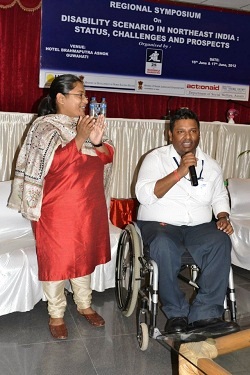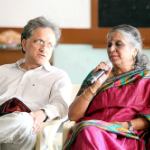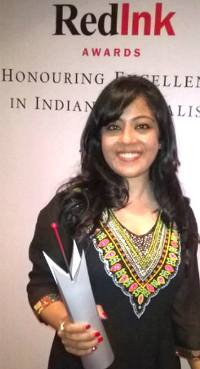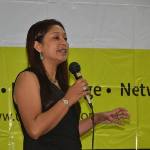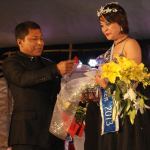Photos by Vivek. R. Nair
A growing feeling in public conscious about issues related to the Northeast of India is that the term `Northeast’ or NE to address the eight states of India needs to be done away with.
This was expressed by author and historian Ramachandra Guha besides other journalists, authors, entrepreneurs and Bangaloreans who attended the first of the series of The Thumb Print Conversations, that threw up interesting revelations and provided food for thought too.
The Thumb Print launched its Conversation series in Bangalore on April 14 with a discussion on `Media and Northeast India: The Way Ahead’. This was organized in collaboration with Indian Social Institute (ISI) Bangalore at the ISI premises.
True to the occasion, those who attended were seated in a circle, with no one on a higher level or lower level. Director of Indian Social Institute Father M K George who co-organised the event welcomed the gathering. It was an afternoon when mekhla chador (Assamese traditional dress) and mallige (jasmine) came together, while Bangaloreans braved the sweltering April heat to engage in an invigorating discussion.
Walter Fernandes of North Eastern Social Research Centre started the conversation, by noting that people of the region feel alienated. Fernandes said most of the reporting he saw coming out of the region was about elections, natural disasters and insurgency.
“Unless we understand the state of media today, we won’t know why the region is hardly covered. Coverage of Northeast India is almost how the First World media covers the third world. Tripura Chief Minister Manik Sarkar won four elections, but hardly got the coverage given to Narendra Modi,’’ said independent journalist and gender specialist Ammu Joseph.
Ramachandra Guha who spoke of his short visits to Manipur, Meghalaya, Assam and Arunachal Pradesh said he could take a detached view about the subject, and that efforts like The Thumb Print were needed. He cautioned that The Thumb Print should be careful not to become an activist voice. He recalled about Grassroots Options, another interesting magazine from Shillong in Meghalaya that used be run by two enterprising Linda C and Sanat Chakraborty, which they could not sustain.
Part of the group that attended the event admitted ignorance of the vast region, while wishing to know more. Author and journalist Gita Aravamudan said a 2009 visit to Imphal along with a group of women journalists was an eye-opener to them. “Women of the Northeast are strong. We walked with Irom Sharmila when she was released temporarily. She could be like any other young woman in the prime of her life, but she decided to fast for a cause.’’ Aravamudan said, “We would have tea at the shop of a lady who had sent her kids to Bangalore. I talked to the middle-aged Meira Paibis who were sorrowful about Manorama and women like her.”
Simanta Sharma of Assam Society of Bangalore complained that there was sensationalism in the coverage of Northeastern issues. "Remember how one SMS text message triggered the exodus from Bangalore,’’ he said. Talking of the lack of representation of Northeast India in mainstream media and the government, he said, “We have very few Members of Parliament from the Northeast. Most mainstream media houses have to please advertisersand Northeast India does not figure in the corporate media.”
Then, Managing Editor of The Thumb Print, Teresa Rehman introduced the magazine through an audio-visual. She said, “We are a brave international venture with a northeastern soul and started on a shoestring budget. “I had to struggle to find space in the so-called ‘national’ media. So, I created my own space.” She added that The Thumb Print at the moment can best be described as a scaffold trying to maintain a precarious balance between the region and the world. But we hope to grow, not only in numbers and figures but as an institution that will help dispel many myths and stereotypes about the region and aid in bonding with the world.
Adding to this, Sudipto Mondol, Principal Correspondent of The Hindu spoke of the dearth of mainstream media correspondents in the Northeast, while Walter Fernandes said the region had no voice politically. “Only insurgency seems to be important. The people in Northeast want to build bridges. We should stop talking and start doing something after accepting the realities and challenges,’’ said Fernandes.
RJ and anchor Vasanthi Hariprakash observed how with seven States plus Sikkim having at least 200 different ethnicities, only one correspondent covers them all for a mainstream publication.
Teresa Rehman elaborated about the challenges that came up with covering the region’s issues. “A militant leader asked me if I was a government agent as I was asking many questions. There are many dangers and little support for journalists reporting from the region. The region has multiple languages which need interpretation and I have to take the help of local interpreters while reporting from states like Manipur and Mizoram. People have asked me if I wore bullet proof jackets while reporting from a conflict-zone. This is something that is unheard of by journalists in the region who work with rudimentary equipments.
Rehman added, “The region is often ghettoized as a monolith. In fact, we had consciously decided not to have the term ‘Northeast’ in our name.
To this, Guha said, “We should gradually get over the term Northeast. The Thumb Print should help in that.” He referred to Pahar, a Hindi journal from the western Himalayas by a dedicated person named Srikant Pathak. He’s worth meeting and brings out a few print issues. “You should consider having a print issue sometimes. Try to imagine, a scholar in some remote part of Mizoram having all copies of The Thumb Print,” Guha added.
Gita Aravamudan noted that people ``who make decisions in mainstream media are far removed from the realities of remote areas. I faced this as a freelancer living in Tiruvananthapuram, a State capital. The Thumb Print is just 10 months old now. Ten months is a very short time for a magazine.
Journalist and award-winning filmmaker Nupur Basu, Many mainstream publications and channels had commitment for local stories fm. remote locations. Basu referred to Tongam Rina, the Associate Editor of Arunachal Times, Tongam Rina, who was shot at point-blank range close to her office in Itanagar on 15 July 2012. She was critically injured. “I have heard recentlt that she has been invited by a German NGO for a one-year stay in that country. Rina has been invited by 'Hamburger Stiftung', a German NGO that cares for journalists in need. Its an irony that she could not get support in this huge country.
Highlighting the trouble with fragmentation of editions by print media houses, Ammu Joseph said, “Delhi is like the First world for us. Certain people speak for the nation. Anyone who questions the government is called anti-national.’’
Pranjal Arabinda Medhi, an entrepreneur who started a restaurant of Assamese cuisine in Bangalore said that people from all communities enjoy food in his restaurant. Then the conversation geared towards sharing inter-mingling of cuisine and food habits which could be a good idea of assimilation to begin with.
Medhi spoke of the general ignorance of those in government while dealing with people from the Eight States. He said, “When I showed a policeman my driving licence issued from Assam, he asked for my Indian licence. People ask me if I need a visa to visit Assam.’’
Simanta Sharma spoke of the need for youth from the region living in cities such as Bangalore, to assimilate into the local community. He added, “But that is so as they feel comfortable within their group.’’
Director of Openspace, a grassroots organization, Anita Cheria observed, that “Many people who've broken free of vulnerable identities want to be identified as mainstream rather than anything else. That’s the challenge we face in gaining support during solidarity campaigns.’’
Mizan ul Haque, a lawyer from Assam practicing in Bangalore said that he heard about the Northeast exodus through a call from Guwahati. He rued, “The rumours were aggravated because of the insensitivity of the media while reporting on the region.”
Teresa Rehman said, “We want to celebrate the NE with a small beginning. Hence, emerged The Thumb Print. We want to celebrate small things like Guwahati city for instance. All the cities have been celebrated but not Guwahati.”
In the end, what emerged was – the need to decide what is mainstream for a start.
That people in the Silicon City wanted to know more about the eight States and contribute their bit too, was definitive at the end of the conversation.
Find us on facebook: facebook.com/TheThumbPrintMag








